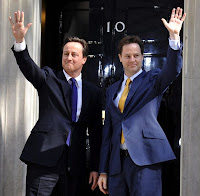THE REGIMES
Al Qaeda; translates roughly as ‘The Base’, Al Qaeda is a
global Islamist terrorist organisation founded by Osama Bin Laden (between 1988
and 1989, origins traceable to the Soviet War). It calls for a global Jihad and
a strict interpretation of Sharia Law (characterised by religious intolerance and the oppression of women’s rights).
NATO; stands for; North Atlantic Treaty Organisation. It’s a
collective of different countries across the globe, of which America and
Britain are both a part of, which steps into foreign conflicts in order to
defend the innocent.
Taliban; an Islamic fundamentalist militant movement. It
ruled large parts of Afghanistan and its capital, Kabul, as the Islamic Emirate
of Afghanistan from September 1996 until October 2001. It gained diplomatic
recognition from three states: Pakistan, Saudi Arabia, and the United Arab
Emirates. The Taliban were originally assembled and financed by the Pakistani
military as a covert way of attacking their enemies.
Note 1; while the Taliban and Al Qaeda
do have some significant ties, they are NOT the same organisation, and have
separate goals.
Note 2; A 15 year old girl was recently shot in the head while campaigning for women's rights against Sharia Law. http://www.bbc.co.uk/news/world-asia-19908409
Note 2; A 15 year old girl was recently shot in the head while campaigning for women's rights against Sharia Law. http://www.bbc.co.uk/news/world-asia-19908409
THE LEADERS
The following
is a list of the most important and influential figures, past and present, in the Middle
Eastern conflict.
Barak Obama; current American President.
David Cameron & Nick Clegg; current joint-leaders of
Great Britain, both from different political parties but serving together as a
‘coalition’.
George W Bush; the previous American President, was in power
when America declared ‘war on terror’.
Osama Bin Laden; founding leader of Al Qaeda (now deceased, killed during an American raid).Osama
actually started his career as a top-agent for the American CIA, before
becoming motivated by his belief that American foreign policy oppressed, killed, or otherwise harmed Muslims in the Middle East. Osama was the mastermind responsible for the destruction of the World Trade Centre, along with numerous other mass-casualty attacks against civilian and military targets.
Saddam Hussein; former president of Iraq (now deceased, executed for war crimes), against whom
America and Great Britain later went to war- suspecting him of affiliation with Osama Bin Laden and of stockpiling WMDs (weapons of mass destruction).
Tony Blair; previous Prime Minister of Great Britain, was in
power when America first declared ‘war on terror’.
Note 3; evidence now proves there was never a "collaborative relationship"
between Iraq and Al Qaeda, and nor did Saddam Hussein actually possess any WMDs.
Note 4; despite ordering the invasion and looting of neighbouring Kuwait in 1990 (leading to his defeat in the first Golf War by NATO forces), Saddam was not stripped of his rule, even though he was widely condemned for the brutality of his dictatorship
Note 4; despite ordering the invasion and looting of neighbouring Kuwait in 1990 (leading to his defeat in the first Golf War by NATO forces), Saddam was not stripped of his rule, even though he was widely condemned for the brutality of his dictatorship
THE PLACES
Afghanistan; a region of the Middle East, and base of operations
for the Taliban.
America
Britain
Iraq; a region of the Middle East, ruled over by the dictator
Saddam Hussein.
Pakistan; although this country is chiefly responsible for
financing and initially training Al Qaeda, Pakistan cut its associations with
the terrorist group after their attack on the World Trade centre to avoid the oncoming
wrath of America.
Saudi Arabia; One of the largest regions in the Middle East, it
also has the world's second largest oil reserves which are concentrated largely
in the Eastern Province. Oil accounts for more than 95% of exports and 70% of
government revenue.
Note 4; since the end of WW2, Britain
and America entered into (what politicians are referring to as) a “Special
Relationship”. This essentially means that whenever one country enters into a
war, the other must offer its full support.











No comments:
Post a Comment